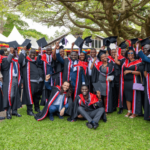The day Samuel Nyasha Cikowerwo defended his PhD on regulating witchcraft in Zimbabwe is also the day that saw the highest number of logins to date at Makerere University. His defense has drawn considerable interest from scholars, lawyers, human rights activists, and international observers interested in the socio-political ramifications of his research.
Regulation of witchcraft in Zimbabwe is a subject that still remains very sensitive and controversial. In fields such as anthropology, history, and sociology, it has attracted global interest because it reflects a complex interplay between cultural, legal, and human rights issues. This broad interest contributed to an unexpected surge in attendance for the defense.
Cikowerwo’s Research Focus
In his presentation, Cikowerwo mentioned some themes touching on colonial legacies, indigenizing beliefs, and human rights, which are very important in the regulation of witchcraft in Zimbabwe. He showed that there is a need to understand what ‘Uroyi’ is, the meaning of witchcraft amongst the Shona, which would necessitate placing it in a cultural context rather than Western legal frameworks.
Uroyi has proved to be a complex, fluid concept-a very important archive in understanding how Madzimbabwe make sense of the supernatural and construct ideas of justice and punishment. I open this subject for discussion without exoticising Africa. I implore you to use culturally contextual terms, renew interest in Madzimbabwe knowledge systems and institutions of justice,” Nyasha urged during his defense.
Witchcraft in Zimbabwe: A Historical Overview
Regulation of witchcraft in Zimbabwe is in many ways a prolonged and contentious issue deeply interwoven into the colonial and post-colonial legal frameworks, respectively. The issue of witchcraft leapt into prominence during the British colonial era with the introduction of the 1899 Witchcraft Suppression Act. This act criminalized accusations of witchcraft and traditional practices associated with it; authorities tried to suppress the beliefs they regarded as superstitious and potentially disruptive.
This means the act criminalized accusing somebody of being a witch, performing or claiming to have performed witchcraft, and using any article with witchcraft. When Zimbabwe finally got independence in 1980, this law was still in practice; for a number of people, it seemed like a colonial hangover whose relevance was an affront to a postcolonial democracy which ought to have given credence to witchcraft practices as part of the Zimbabwean culture.
Legal Reforms and Cultural Recognition
In 2006, Zimbabwe revised the Witchcraft Suppression Act to align it more with cultural beliefs and practices. The revised legislation acknowledged that witchcraft exists but made its application to harm someone a criminal act. This literally decriminalized belief in witchcraft, although the practices amounting to harm were still penalized.
Even today, the regulation of witchcraft in Zimbabwe is a contentious and evolving field. Belief in witchcraft is often deeply ingrained in many cultures, and accusations, social conflict, and even bloodshed result. Most often, the legal framework cannot cope with such issues because the traditional perceptions of witchcraft hardly accommodate themselves within the legal structures imported from the West.
Challenges in the Regulation of Witchcraft
It was with regard to this that the case of Cikowerwo best brought out how impossible it could be to subject witchcraft to the forces of a modern legal system. The revised law had attempted, on one hand, to pay homage to tradition and, on the other hand, to prevent abuses such as false accusations and social disruption. But there is a fine line that has to be drawn between recognizing beliefs deeply held and yet upholding the imperatives of the law.
The defence of his research has only gone to prove that the regulation of witchcraft in Zimbabwe involves less of the letter of the law and more an understanding of the cultural narratives with many layers. The interest his thesis defence aroused would point to the relevance of the issues and the need for nuanced discussions on regulating culturally sensitive topics anywhere in the world.













